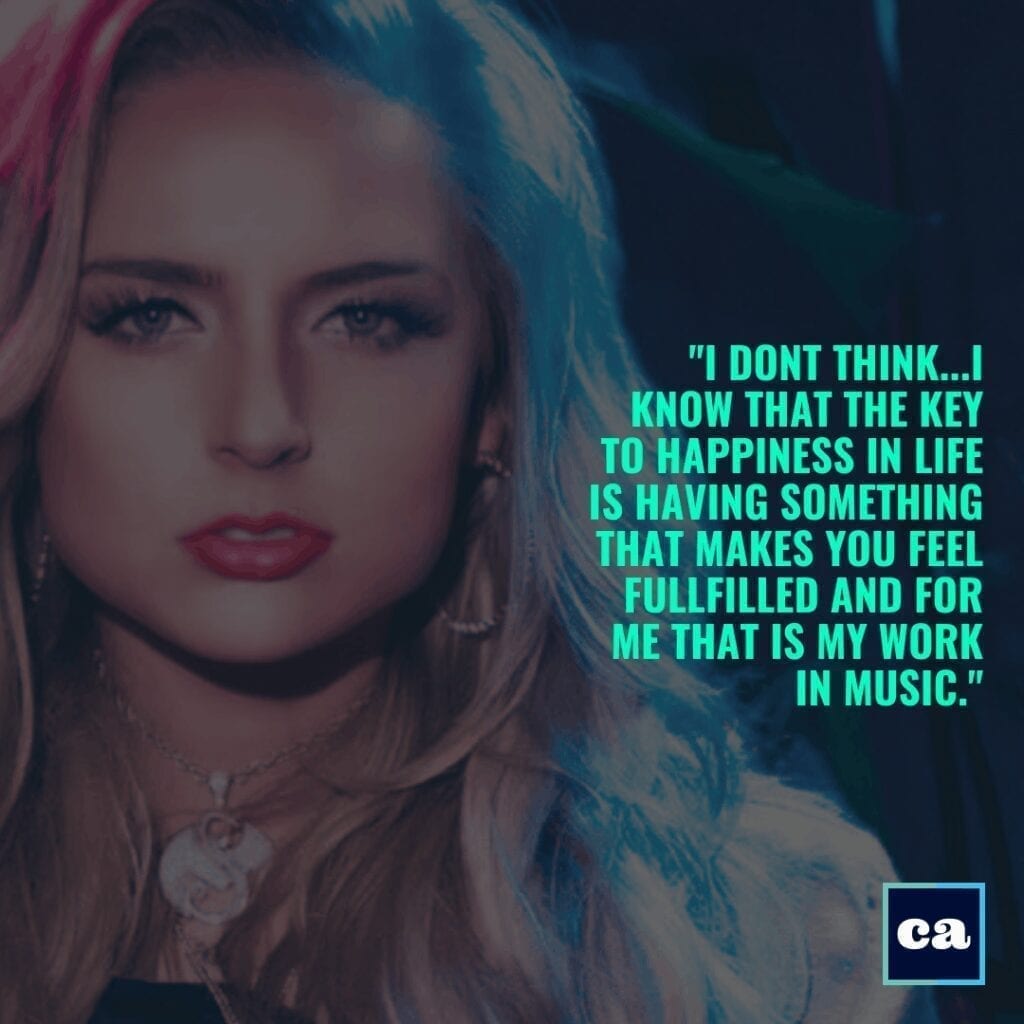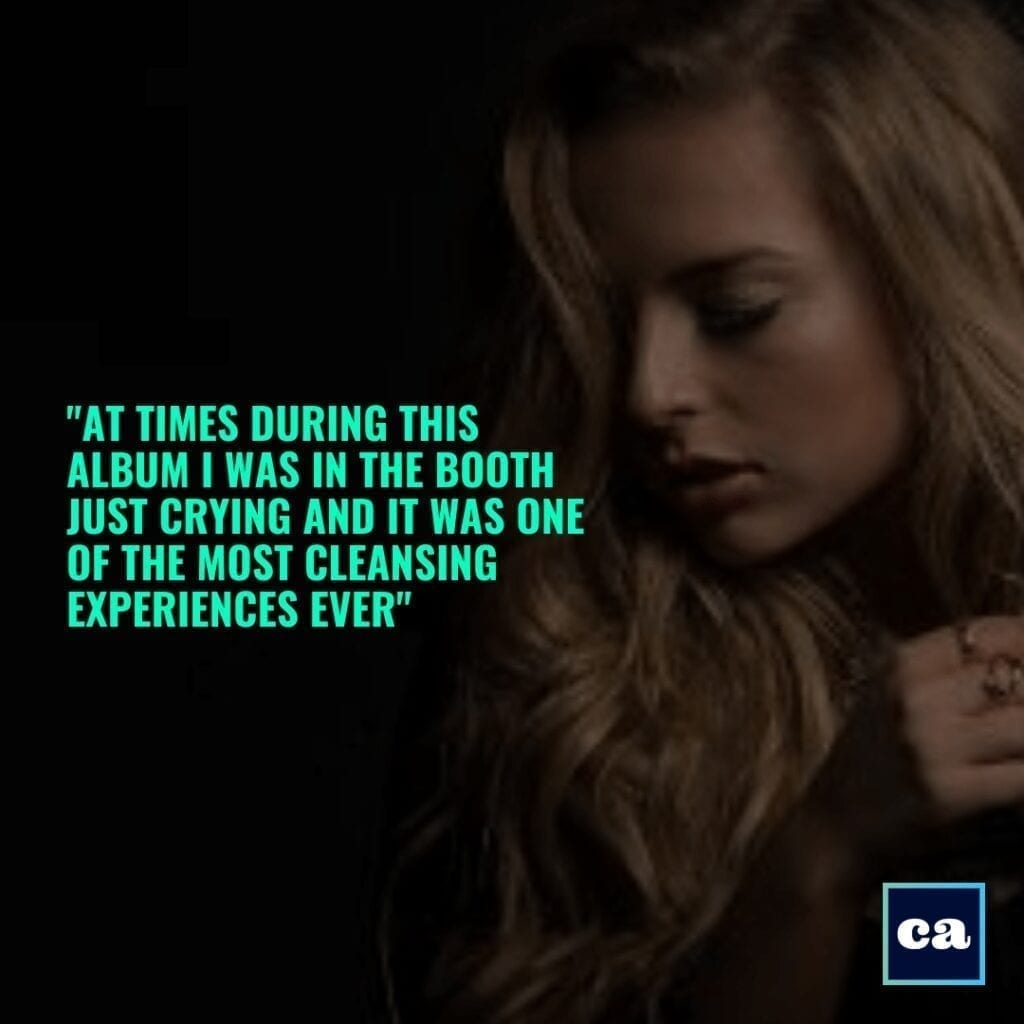In Episode 8 of the Disruptors for Good podcast I speak with Mackenzie Nicole, the classically trained singer, song writer, and musician who speaks candidly about her personal issues with mental health and the power of music and creativity.
Mackenzie Nicole is the daughter of a disruptor herself, Travis O’Guin. Travis is the CEO and Co-founder, along with superstar rapper Tech N9ne of the independent record label Strange Music.
Listen to more Causeartist podcasts here.
Learn more about Travis, Strange Music and their journey in selling millions of records and creating the industry gold standard of music touring.
Now 19 years-old, Mackenzie’s fist ever song at 9 years-old was with Tech N9ne and Three Six Mafia, and as she says in the podcast “so I always knew my path would be different than any other pop-singer ever”.

Usually on the podcast we cover founders and CEO’s disrupting certain business sectors, but I thought this was an important opportunity to chat with someone trying to disrupt an industry that for far to long has been stacked with manufactured artist and pop singers.
It was also a great opportunity to talk about mental illness and how her generation deals with the pressures of social media. Its also a powerful conversation about how music and the process can be a great healer for mental health and wellness and how finding YOUR purpose is one of the most healthy things we can do in life.

Interview Transcript
00:00
Grant: What’s up everybody, this is Grant at Causeartist. Today we’re doing things a little differently. We’re chatting with recording artist and pop singer, Mackenzie Nicole. Usually, we talk to business founders and CEOs about how they’re disrupting their industries, but today’s guest is unique. I had the opportunity to visit Mackenzie at the Strange Music headquarters in Kansas City to discuss mental illness and how she’s using music and her platform to address this topic. Despite being only 19 years old, she’s incredibly talented and smart. This conversation is about finding your purpose, using your talents, and making a positive impact on the world. Mackenzie was born into Strange Music, an independent Hip Hop label founded by her dad and Tech N9ne. They’ve disrupted the music industry for over two decades. Mackenzie comes from a lineage of disruptors and is now looking to shake up the pop music scene. Enjoy the conversation!
02:45
Grant: We were talking about how your dad disrupted the music label model. You seem to be disrupting pop music in your way. Can you tell us about that?
02:54
Mackenzie: When I started in music, my first recording feature was at nine years old with Tech N9ne and Three 6 Mafia. So, I was always going to take an unconventional route. I did features with labelmates like Recognize of Mayday, Prozak, Tech, and Krizz Kaliko, which gave me a broad range of music experiences. For my last album, I tried the conventional pop route, working with the right ingredients to create a by-the-book pop album. But my passion lies in creating genre-less music that transcends traditional boundaries. My upcoming project, Mystic, represents my evolution as an artist with full creative control.
03:55
Grant: You grew up around diverse artists and genres, including opera. How has this blend of influences shaped your music?
04:29
Mackenzie: I joke that I’m an opera singer trying to do pop music on a rap label inspired by rock bands. I filter my music through various lenses. While I’m spearheading the pop division, my background in opera and my exposure to rap and rock give me a unique perspective. Everyone here at Strange Music is inspired by a variety of things, which allows us to create genre-defying music.
05:45
Grant: Genres evolve over time, and social media has changed how music is consumed and created. How has this affected you as an artist?
06:29
Mackenzie: The accessibility of social media has eliminated the concept of untouchable superstars. While it improves music discoverability, it also exposes artists to criticism. My generation and future ones will develop in an era without strict categories, allowing for more creative freedom. Artists like Young Thug and Lil Nas X are blending genres in ways that weren’t possible before.
07:52
Grant: What’s your creative process like? Do you start with the music or the lyrics?
08:13
Mackenzie: It’s a bit of both. Usually, my producer sends me a beat, and I write based on what it inspires. I also jot down lines or ideas in notebooks and on my phone. Sometimes a phrase or title I’ve saved will fit perfectly with a beat. It’s a dynamic process that depends on the circumstances and the music.
09:25
Grant: Given your classical background, do you envision creating a blend of opera and pop music?
09:55
Mackenzie: Absolutely. I’ve already incorporated operatic elements into rap songs for Tech and Prozak. My next album features a track called “The House Above the World” that blends operatic influences with alternative pop. Opera taught me the technical rules of music, which I can now break through experimentation, adding depth to my music.
10:37
Grant: You can sing opera in six different languages. Could you create a unique genre like Russian opera pop?
11:02
Mackenzie: I could definitely try! I think I’d have a monopoly on that niche market.
11:14
Grant: Creativity often comes from dark places. How has your experience with mental illness influenced your music?
12:11
Mackenzie: Songwriting is incredibly dark because you have to acknowledge, articulate, and share your deepest feelings. My upcoming album, Mystic, is about my mental health journey. I went through a severe breakdown last year, and music became my therapy. Recording this album was cathartic, allowing me to quantify and articulate my experiences.
14:50
Grant: Having supportive friends is crucial. How important was your support system during your mental health struggles?
15:39
Mackenzie: My friends were lifesavers. They recognized I was going through something and encouraged me to seek help. One friend persistently referred me to his psychiatrist, which was instrumental in my recovery. Not everyone has that support, and it’s vital for mental health awareness.
17:46
Grant: Passion can be a powerful outlet. How has music served as a therapeutic tool for you?
18:31
Mackenzie: Initially, I didn’t see music as therapy. My last album wasn’t an outlet for my feelings. However, my therapist encouraged me to channel my experiences into my art. Mystic became a way to process and heal from my mental breakdown. It’s crucial to find something that makes you feel fulfilled, whether it’s music, volunteering, or any creative pursuit.
20:25
Grant: What impact has volunteering at a women’s shelter had on you?
22:02
Mackenzie: Volunteering at a women’s domestic violence crisis center has been incredibly gratifying. It’s taught me compassion and given me a deeper understanding of others’ lives. It also influences my music by exposing me to diverse stories and experiences.
24:56
Grant: How do you balance creating music and promoting it, especially when the content is deeply personal?
25:22
Mackenzie: It’s challenging to revisit dark places while promoting personal music. However, having a good support system and focusing on the bigger picture helps. I’m excited about the ambitious concepts and visuals for this album and look forward to performing new songs live.
29:53
Grant: Looking ahead, what do you hope to achieve with your music career?
30:16
Mackenzie: I want to look back and know that I stayed true to myself. My goal is to create music that represents who I am and resonates with others. It’s about having creative control and making art that’s authentic and impactful.
32:44
Grant: What’s the plan for your upcoming album and tour?
32:55
Mackenzie: Mystic is a deeply personal and ambitious project. We have unique visuals and promotional plans in the works. I’m also performing new songs at tour dates this spring in Denver and Kansas City. I’m excited to see how people react to this new direction.
Grant: Thank you, Mackenzie, for sharing your journey and insights. We look forward to hearing more from you and seeing how you continue to disrupt the music industry.
Mackenzie: Thank you, Grant. It’s been great talking to you.







